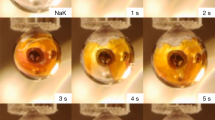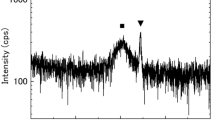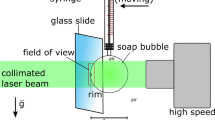Abstract
CERTAIN methods of measuring the surface tension of mercury, especially the ‘big-drop’ method as used by Popesco (Ann. de Physique, 3, p. 402; 1925), appear to show that the presence of air or other gas increases the surface tension of a freshly formed surface by about 100 dynes. The ‘drop-weight’ method, on the other hand, shows a difference of only a few dynes between the values in air and in vacuo, and this indeed in the opposite sense to that indicated above (Harkins, Jour. Am. Chem. Soc., Dec. 1920). Observations by the writers using the same mercury in order to measure its surface tension by the above as well as other methods show that the differences in the measured values of the surface tension are due to differences in the method and not to differences in the quality of mercury (Trans. Faraday Soc., May 1927).
This is a preview of subscription content, access via your institution
Access options
Subscribe to this journal
Receive 51 print issues and online access
$199.00 per year
only $3.90 per issue
Buy this article
- Purchase on Springer Link
- Instant access to full article PDF
Prices may be subject to local taxes which are calculated during checkout
Similar content being viewed by others
Author information
Authors and Affiliations
Rights and permissions
About this article
Cite this article
OLIPHANT, M., BURDON, R. Adsorption of Gases on the Surface of Mercury. Nature 120, 584–585 (1927). https://doi.org/10.1038/120584b0
Issue Date:
DOI: https://doi.org/10.1038/120584b0
Comments
By submitting a comment you agree to abide by our Terms and Community Guidelines. If you find something abusive or that does not comply with our terms or guidelines please flag it as inappropriate.



